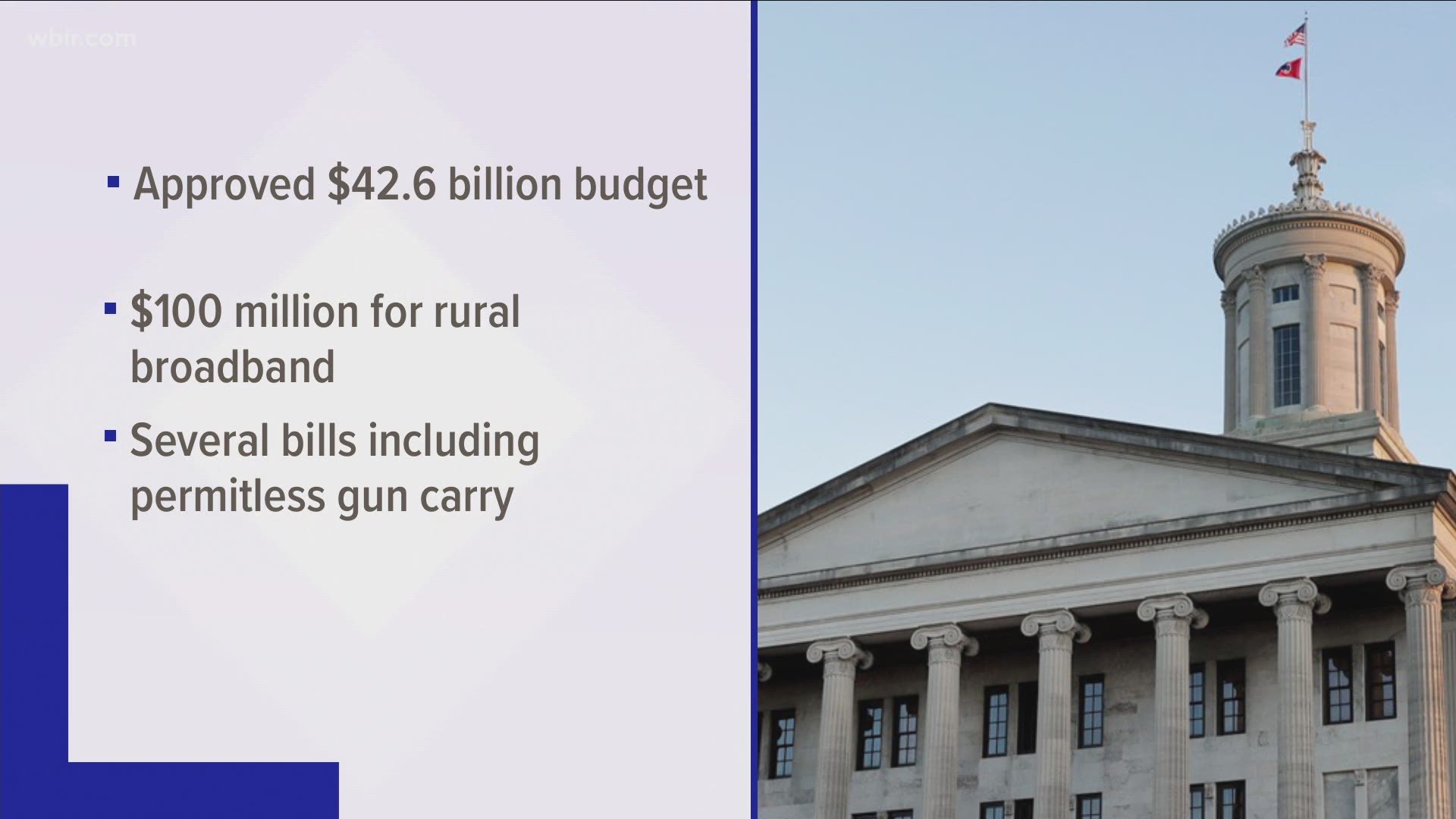NASHVILLE, Tenn. — After a year filled with new investments, controversial proposals and historic moves in the Tennessee legislature as the state recovers after the pandemic, the 2021 legislative session came to a close Wednesday.
During the session, Governor Bill Lee passed a $42.6 billion budget which included funds for a week-long food sales tax holiday. It also made investments in infrastructure, literacy, mental health, broadband technology and maintenance of state equipment and buildings.
Officials said that the budget was a sign that the state was starting to return to its pre-pandemic priorities, with an emphasis on investing in partnerships with private agencies.
Gov. Lee also signed a list of bills into law during the session. One of them included a bill extending "constitutional carry" rights for anyone who wants to carry a concealed firearm. Under the bill, anyone who is over 21 years old and meets the requirements to carry can carry a gun without a permit.
He also signed Evelyn Boswell's Law, which passed unanimously in the House and Senate. It requires parents to report their children as missing within 24 hours if they are 12 years old or under.
It is named after a Sullivan County toddler who was not reported missing for several months. Her body was later discovered on a family-owned property, and her mother was charged with murder.
A series of bills targeting the LGBTQ+ community was also signed into law, despite controversies surrounding them. One of them prevents transgender students in middle and high school from playing on teams that align with their gender identity.
The law requires that a student's gender be determined by their sex at the time of their birth when it comes to school athletics, and says they must provide evidence of their birth sex if it doesn't appear on their birth certificate.
Some lawmakers of the bill, like Rep. Eddie Mannis (R-Knoxville), said it would only marginalize teens. Opponents of the bill said it could cost the state money, warning that boycotts took place against states that passed similar bills.
"That Tennessee is talking about this and looks on the verge of passing this -- conventions will go elsewhere," said Joe Woolley, CEO of the Nashville LGBT Chamber of Commerce. "They will not take their attendees to a place that is not welcoming ... We are about to step in front of a speeding bus and get ran over if we are not careful."
Proponents of the law said it protects student athletics and ensures students have fair shots at scholarships.
Another bill requires school districts to give families a month's notice and allow students to opt-out of lessons related to sexual orientation. Experts said it could apply to history lessons about Supreme Court civil rights cases or the AIDS epidemic.
Some even said discussions on Shakespeare, James Baldwin or Virginia Woolf could be at risk because the content contains topics of sexuality or because of the sexual orientation of the authors — effectively censoring teachers.
"This is not about advocating a particular kind of identity, way of being or lifestyle. It’s about exposing students to human cultural diversity—which is what education should do," said University of Tennessee Women, Gender and Sexuality professor Patrick Grzanka.
They also passed a bill that requires businesses and government facilities open to the public to post a sign if they let transgender people use multi-person bathrooms, locker rooms or changing rooms.
The Human Rights Campaign opposes the proposed requirement and says it would be the first of its kind.
Two bills meant to reform criminal justice in Tennessee passed the legislature — The Alternatives to Incarceration Act and the Reentry Success Act. They were meant to develop community-based alternatives to incarceration and change the ways people reenter society, to reduce the chances of reincarceration.
A bill meant to help pay for a new stadium in downtown Knoxville also passed the legislature. It allows the local government to capture and use state sales tax collected inside the stadium to pay for the project. Gov. Lee also put $13.5 million in his amended budget to help cover construction costs.
RELATED: Bill allowing use of state sales taxes on Knoxville stadium project heads to governor's desk
A bill that allows businesses in Tennessee to continue selling liquor and beer to-go for three more years was also passed by the legislature. The sales were originally authorized in executive orders related to the pandemic, and the law will now last through July 2023.
Over $250 million was also invested in the Mental Health Trust Fund, to support the mental health of Tennesseans. Gov. Lee also invested $100 million to provide broadband infrastructure and internet access in underserved and rural areas. He also dedicated $100 million in transportation infrastructure maintenance.

